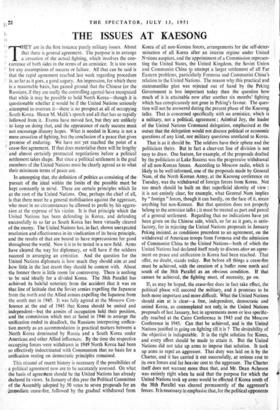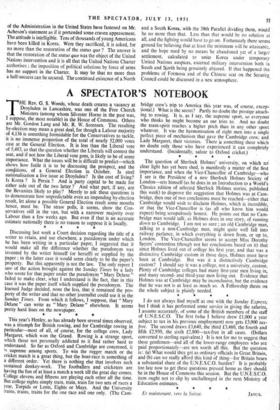THE ISSUES AT KAESONG
HEY are in the first instance purely military issues. About that there is general agreement. The purpose is to arrange a cessation of the actual fighting, which involves the con- currence of both sides in the terms of an armistice. It is too soon for any assumptions of success or failure. All that can be said is that the rapid agreement reached last week regarding procedure is, so far as it goes, a good augury. An impression, for which there is a reasonable basis, has gained ground that the Chinese (or the Russians, if they are really the controlling agents) have recognised that while it may be possible to hold North Korea—though it is questionable whether it would be if the United Nations seriously attempted to overrun it—there is no prospect at all of occupying South Korea. Hence M. Malik's speech and all that has so rapidly followed from it. Events have moved fast, but they are unlikely t to keep on doing that, and the appearance of early success must not encourage illusory hopes. What is needed in Korea is not a mere cessation of fighting, but the conclusion of a peace that gives promise of enduring. We have not yet reached the point of a cease-fire agreement. If that does materialise there will be lengthy and almost certainly protracted negotiations before a political settlement takes shape. But since a political settlement is the goal members of the United Nations must be clearly agreed as to what their minimum terms of peace are.
In attempting that, the definition of politics as consisting of the pursuit of the ideal within the limits of the possible must be 'kept constantly in mind. There are certain principles which lie at the root of the United Nations. One, perhaps the chief of all„ is that there must be a general mobilisation -against the aggressor, who must in no circumstances be allowed to profit by his aggres- sion at the expense of his victim. It is that principlc which the United Nations has been defending in Korea, and, defending successfully in so far as South Korea has been virtually cleared of the enemy. The United Nations has, in fact, shown unexpected resolution and effectiveness in its vindication of its basic principle, and the results of that are bound to have repercussions for good throughout the world. Now it is to be tested in a new field. Arms have cleared the way for diplomacy, or will have if the soldiers succeed in arranging an armistice. And the question for the United Nations diplomats is how much they should aim at and bow little in the last resort they should be content with. About the former there is little room for controversy. There is nothing to be said ideally for a divided Korea. The 38th Parallel has achieved its baleful notoriety from the accident that it was on that line of latitude that the Soviet armies expelling the Japanese from the north and the Allied armies expelling the Japanese from the south met in 1945. It was fully agreed at the Moscow Con- ' ference at the end of 1945 that Korea should- be united and independent—but the armies of occupation held their position, and the commission which met at Seoul in 1946 to arrange the unification ended in deadlock, the Russians interpreting unifica- , tion merely as an accommodation in practical matters between a North Korea dominated by Russia and a South Korea under American and other Allied influences. By the time the respective occupying forces were withdrawn in 1949 North Korea had been so effectively indoctrinated with Communism thaeno basis for a unification resting on democratic principles remained.
This resume of recent history is necessary if the possibilities of a political agreement now are to be accurately assessed. On what the basis of agreement should be the United Nations has already declared its views. In January of this year the Political Committee of the Assembly adopted by 50 votes to seven proposals for an -,immediate cease-fire, followed by the gradual withdrawal from Korea of all non-Korean forces, arrangements for the self-deter- mination of all Korea after an interim regime under United Nations auspices, and the appointment of a Commission represen- ting the United States, the United Kingdom, the Soviet Union and Communist China to attempt a larger settlement of all Far Eastern problems, particularly Formosa and Communist China's relation to the United Nations. The reason why this practical and statesmanlike plan was rejected out of hand by the Peking Government is less important today than the question how much of it is attainable now after another six months' fighting which has conspicuously not gone in Peking's favour. The ques- tion will not be answered during the present phase of the Kaesong talks. That is concerned specifically with an armistice, which is a military, not a political, agreement ; Admiral Joy, the leader of the United Nations Command delegation, emphasised at the outset that the delegation would not discuss political or economic questions of any kind, nor military questions unrelated to Korea.
That is as it should be. The soldiers have their sphere and the politicians theirs. But in fact a clear-cut line of division is not easy to draw. One feature, for example, of the proposals drafted by the politicians at Lake Success was the progressive withdrawal of all non-Korean forces. According to Moscow radio, which is likely to be well-informed, one of the proposals made by General Nam, of the North Korean Army, at the Kaesong conference on Tuesday, was the withdrawal of foreign forces from Korea. Not too much should be built on that superficial identity of view : it is not entirely clear, for example, what General Nam implies by " foreign " forces, though it can hardly, on the face of it, mean anything but non-Korean. But that question does not properly belong to the armistice talks ; it must be treated as part and parcel of a general settlement. Regarding that no indications have yet been given on the Chinese side, which, so far as it goes, is satis- factory, for in rejecting the United Nations proposals in January Peking insisted, as conditions precedent to an agreement, on the withdrawal of American troops from Formosa and the admission of Communist China to the United Nations—both of which the United Nations had declared itself ready to discuss after an agree- ment on peace and unification in Korea had been reached. That offer, no doubt, stands today. But before all things a cease-fire must be achieved, with the creation of a buffer zone north and south of the 38th Parallel as an obvious condition. If that cannot be achieved, the fighting must, of necessity, go on.
If, as may be hoped, the cease-fire does in fact take effect, ,the political phase will succeed the military, and it promises to be both more important and more difficult. What the United Nations should aim at is clear—a free, independent, democratic and united Korea, as contemplated not only, in the United Nations proposals of last January, but in agreements more or less specific- ally reached at the Cairo Conference in 1943 and the Moscow Conference in 1945., Can that be achieved, and is the United Nations justified in going on fighting till it is ? The desirability of the objective is indisputable. It is the right solution for Korea, and every effort should be made to attain it. But the United Nations did not take up arms to impose that solution. It took up arms to repel an aggressor. That duty was laid on it by the Charter, and it has carried it out successfully, at serious cost to its own forces and far heavier cost to the aggressor. The Charter itself does not warrant more than that, and Mr. Dean Acheson was entirely right when he said that the purpose for which the United Nations took up arms would be effected if Korea south of the 38th Parallel was cleared permanently of the aggressor's forces. It is necessary to emphasise that, for the political opponents of the Administration in the United States have fastened on Mr. Acheson's statement as if it portended some craven appeasement. The attitude is intelligible. Tens of thousands of young Americans have been killet1 in Korea. Were they sacrificed, it is asked, for no more than the restoration of the status quo ? The answer is that the restoration of the status quo was the object of the United Nations intervention and it is all that the United Nations Charter authorises ; the imposition of political solutions by force of arms has no support in the Charter. It may be that no more than a half-success can be secured. The continued existence of a North and a South Korea, with the 38th Parallel dividing them, would be no more than that. Less than that would be no solution at all, and the fighting would have to go on. Fortunately there seems ground for believing that at least the minimum will be attainable. and the hope need by no means be abandoned yet of a larger settlement, calculated to unite Korea under temporary United Nations auspices, external military intervention both in South and North being genuinely abjured. If that happened the problems of Formosa and of the Chinese seat on the Security, Council could be discussed in a new atmosphere.







































 Previous page
Previous page